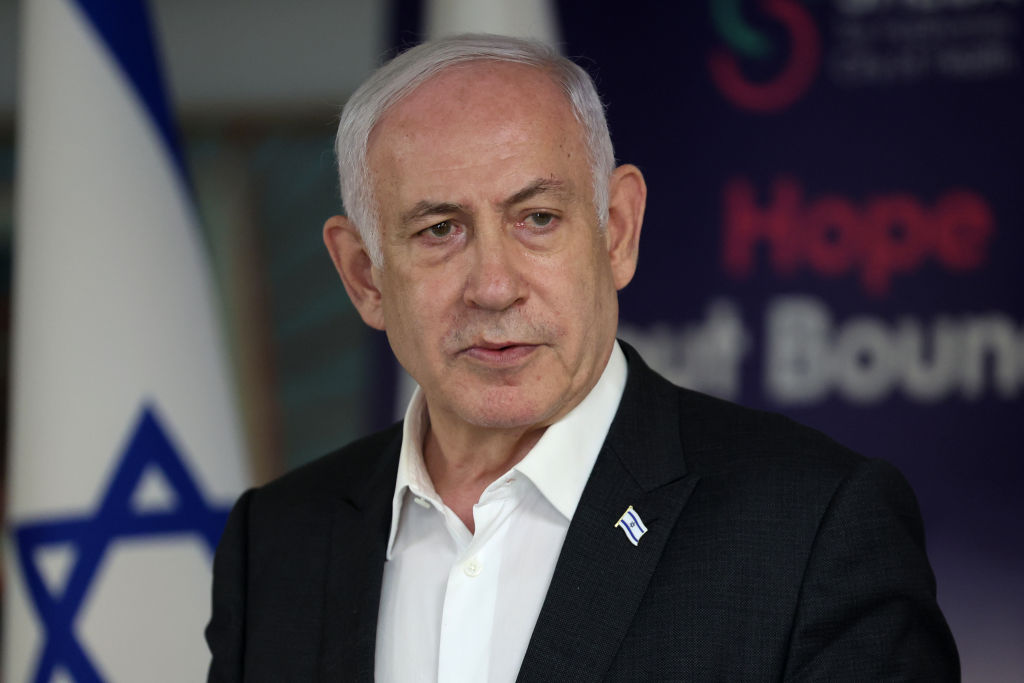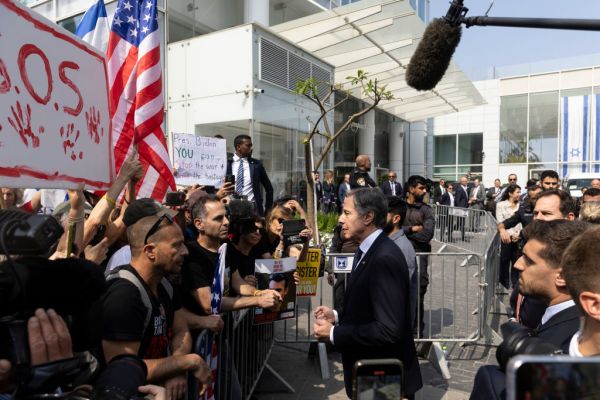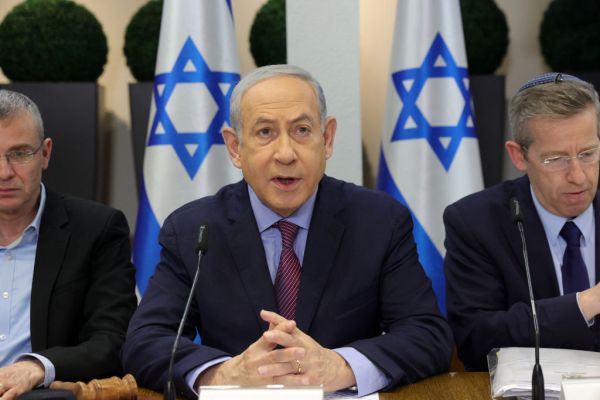JERUSALEM, Israel—With centrist party leader Benny Gantz’s exit from Israel’s government, the War Cabinet lost a centrist voice and the Biden administration lost its preferred interlocutor with Jerusalem. But how might Gantz’s decision substantively reshape the direction of the war and prospects for a hostage deal?
On Sunday, the former Israel Defense Forces (IDF) chief of staff announced his long-anticipated withdrawal from the emergency government and War Cabinet—both formed in the wake of Hamas’ October 7 attack—citing a lack of direction in the resulting eight-month war against the militant group. “Strategic and fateful decisions are made by the government out of political considerations,” Gantz said, calling on Israeli Prime Minister Benjamin Netanyahu to set a date for new elections. “Unfortunately, Mr. Netanyahu is preventing us from approaching true victory.”
The decision followed months of growing rifts within the three-member War Cabinet, as the prime minister doubled down on his vow to deliver an “absolute victory” against Hamas—what his critics have deemed a lofty and vague goal—and Gantz pushed Israel to adopt a hostage deal that has yet to materialize. Last month, the opposition leader threatened to pull his party from the unity government by June 8 if Netanyahu failed to put forward a plan for postwar governance in Gaza. But he chose to delay his announcement after the rescue of four Israeli abductees from central Gaza over the weekend.
A daytime operation by the IDF, Israel’s internal security service, and police secured the safe return Saturday of Noa Argamani, 26; Almog Meir Jan, 22; Andrey Kozlov, 27; and Shlomi Ziv, 41, to Israel after more than eight months in Hamas captivity. Netanyahu seized on the opportunity provided by the rescue to urge Gantz to forgo his planned exit from the government. “This is the time for unity and not for division,” the Israeli premier wrote on X, formerly Twitter. “We must remain united within ourselves in the face of the great tasks before us. I call on Benny Gantz—do not leave the emergency government. Don’t give up on unity.”
But the centrist party’s withdrawal was a long time coming, as Gantz’s sway over the War Cabinet, which includes Defense Minister Yoav Gallant, eroded with each passing month of the war. The rescue operation, though endorsed and celebrated by Israeli officials from across the political spectrum, didn’t reverse Gantz’s stated reasons for leaving the government.
“This great operation doesn’t change the strategic situation,” Matan Kahana, a member of the Knesset representing Gantz’s National Unity party, told The Dispatch. “In the big picture, there are still 120 hostages in the Gaza Strip. We can’t be so unrealistic to believe that we will be able to rescue all of these 120 in operations like we did last Shabbat. We know that the majority of hostages will only come back through a deal. In the last few months, we realized that our influence has reduced. Netanyahu makes decisions not based on what Israel needs, but based on his political survival.”
The biggest question—whether Israel should accede to a ceasefire agreement with Hamas to secure the release of its remaining hostages, and what such a deal might look like—remains in limbo with Gantz’s departure. National security chief Itamar Ben-Gvir and Minister of Finance Bezalel Smotrich, far-right party leaders in Netanyahu’s governing coalition, have both threatened to topple the government if a deal to end the war is reached, arguing that a complete military victory against Hamas should take precedence over the release of hostages.
The exact contours of such an agreement are still unknown, but the prime minister’s office on Monday rejected claims that Israel had offered Hamas a “permanent” halt to the fighting—a consistent demand of the terror group in internationally mediated ceasefire talks. Israel’s Western allies now worry extremist voices in the government will wield outsize power over the trajectory of the war, with Netanyahu’s coalition holding a narrow 64-seat majority in the 120-member Knesset.
Secretary of State Antony Blinken arrived in Israel this week against the backdrop of this unfolding political drama. In meetings with Netanyahu and Gallant Monday night, Blinken made another push for a ceasefire agreement—despite Hamas’ reported rejection of Israel’s latest proposal. Blinken’s visit also follows one of President Joe Biden’s fiercest rebukes of the Israeli premier yet in an interview last week, when he said there was “every reason” to believe that Netanyahu was prolonging the war for political reasons.
Ironically, it may be recent public fighting with the Biden administration that secures Netanyahu’s political survival. Throughout the war, the prime minister has sold an image of himself as the man who can tread a fine line with Washington—standing up to its criticisms of Israel’s campaign in Gaza while also maintaining mostly consistent American support. Netanyahu is scheduled to address the House and Senate on July 24 after receiving a bipartisan invitation from all four congressional leaders last month.
In spite of his spats with the White House or perhaps because of them, the prime minister’s popularity at home has recovered somewhat after a major dip following October 7. A poll by Israel’s Channel 12 last month found that Israelis preferred Netanyahu over Gantz as premier by a margin of 36 percent to 30 percent—the Likud head’s first lead in more than a year. How Gantz’s withdrawal from the government will influence his approval rating, and whether Netanyahu will move to hold new elections before the war’s end, both remain to be seen.
“A confrontation with the Biden administration is just wonderful news for Netanyahu’s reelection campaign, and we are definitely in the midst of his reelection campaign. It’s only a matter of time until he himself will decide that it’s time for an election,” Nadav Eyal, a prominent political commentator at Israeli news outlets Yediot and Ynet, told The Dispatch. “Netanyahu is managing to convince voters that there are no alternatives, and even if they don’t like him, he’s the only person who’s committed to the idea that Israel needs to completely and utterly defeat Hamas.”









Please note that we at The Dispatch hold ourselves, our work, and our commenters to a higher standard than other places on the internet. We welcome comments that foster genuine debate or discussion—including comments critical of us or our work—but responses that include ad hominem attacks on fellow Dispatch members or are intended to stoke fear and anger may be moderated.